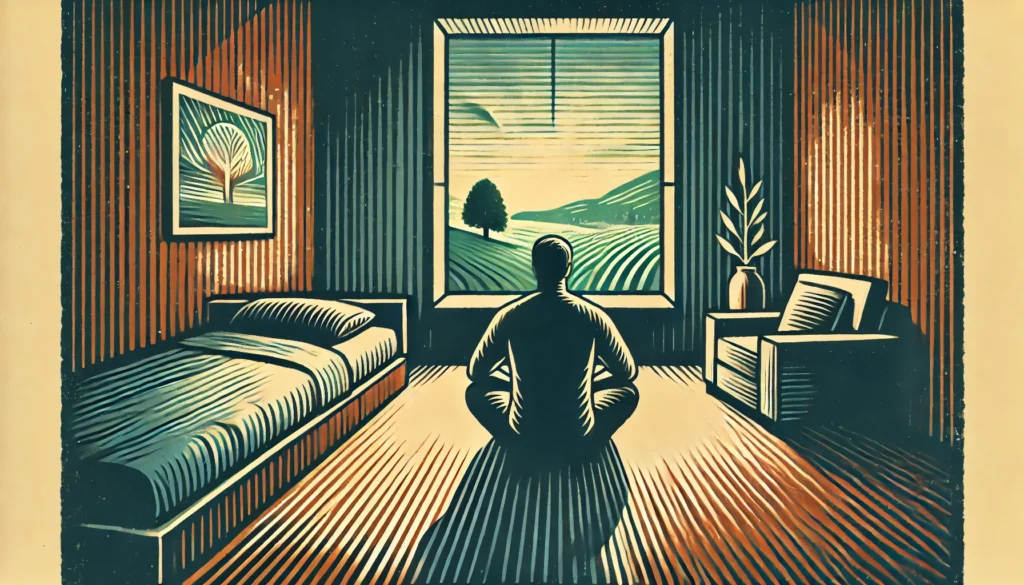READ IT TO ME: Click play to listen to this post.
“Our society is much more interested in information than wonder, in noise rather than silence. And I feel that we need a lot more wonder and a lot more silence in our lives.”― Fred Rogers, American television host
Mr. Rogers is right! There are times in our lives when we need a lot more wonder and silence in our lives. Wonder unfolds in moments of silence. Lying still and alone, looking at the stars twinkle and absorbing the energy of night experience on the side of a mountain. No sight of another and no sound to be experienced. Just you and the great night sky will trigger wonder in the silence of that moment.
Jack Kerouac, the American novelist, once wrote “No man should go through life without once experiencing healthy, even bored solitude in the wilderness, finding himself depending solely on himself and thereby learning his true and hidden strength.”
Solitude creates a respite for reflection and transformation. Addicts need solitude but avoid it like the plague because the quietness stirs discomfort in their minds. When you are quiet for a season of time many thoughts and feelings work their way to the surface of conscious awareness. Confusing ideas, disturbing images, wild fantasies, and weird associations jump up to the front of your awareness like monkeys in a banana tree. It is unnerving. But when you learn to sit with discomfort, going all the way down with it, including embracing feelings of agony, you learn that you will come back up. You become confident that whatever the feeling, in time, it will lessen its intensity and provide inner wisdom for the moment.
Some people try to please everybody and end up pleasing no one, most of all themselves. Or if they think they have been pleasing, it’s like opening a new bottle of vintage wine after becoming intoxicated with the last bottle. They become lost in the drunkenness of dopamine rush by striving to please others through one more planned event that might afford more praise. Solitude becomes a tool to detox from emotional inebriation. Recovery requires that you create solitude in that you practice being alone without being lonely.
Solitude includes silent meditation. It can occur while driving down the street or during a dinner conversation. The message might be a painful truth like, “I just acted like a small child,” or a frightening fact like, “I am deeply loved by another person.” As we accept our imperfections and make peace with ourselves, we increase our sense of solitude.
The result of practicing solitude in recovery is the illumination that comes from introspection and reflection—not criticism and navel-gazing. Solitude provides a space in life to gather perspective. It yields the importance of focus that it is not what happens but how you respond to what happens that matters most. It generates the understanding that everything you need today will be given to you.
Solitude provides a place to encounter your true self. In solitude, you are free to fail. It provides a place to not be bothered by other people. It’s a place where you can think your own thoughts, express your own complaints, and do your own thing whatever it may be. Solitude is a privacy station where you can recharge your batteries. It’s the corner of the boxing ring where your wounds and muscles are well-oiled, and your courage is restored.
In solitude, there is a “hopeful presence”. Solitude is the place where you carve out conversion. It’s where the old self dies to what used to be meaningful and fulfilling, while it opens to the new self-being born to new thoughts and priorities. It’s the place where you block all telephone calls, and eliminate the entertainment of music or the distraction of books. It is simply a place to sit with and contemplate your vulnerable, weak, deprived, and broken self. Solitude is a place to sit with nothingness in my presence of thought.
If you have the discipline to embrace solitude and stay with it, the dark voices of anxiety, hatred, meaninglessness, fear depression, and more that intimidate will gradually lose their strength and recede into the background. This creates space for the softer, gentler voices of the light, hope, and reassurance that you can go down and come back up to return to center.
By listening to your feelings in solitude, both the dark negative and the inspiring positive, those feelings of peace, kindness, gentleness, goodness, joy, hope, forgiveness, and most of all, love will ascend on the horizon. At first, it may seem small and insignificant. Solitude provides a space for these inspiring feelings to grow. It only requires that we maintain solitude and listen. These inspiring feelings come from a very deep place within the recesses of your own brilliance. They have been speaking to you since you were born. You never need to leave that solitude once it is anchored to your heart. This enables you to live an active life while always remaining anchored in your own personal brilliance that resides within you. Solitude nurtures quiet calmness, and being fully awakened to what is happening deep within your own brilliance.
Solitude is the place to cultivate compassion for self, others, and the world around you. It’s the place that fosters giving up measuring value with the yardstick of the world. Ralph Waldo Emerson once said ‘It is easy in the world to live after the world’s opinion; it is easy in solitude to live after our own; but the great person is the one who, in the midst of the crowd, keeps with perfect sweetness the independence of solitude.”
Make solitude a fundamental part of the foundation of your recovery.





